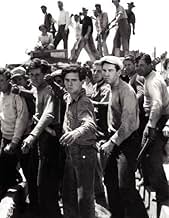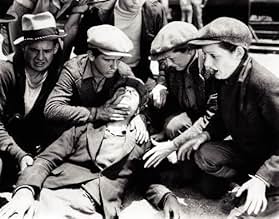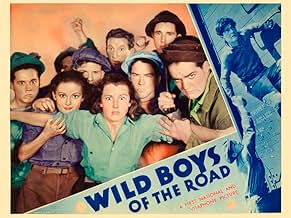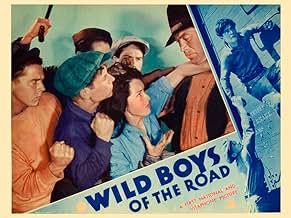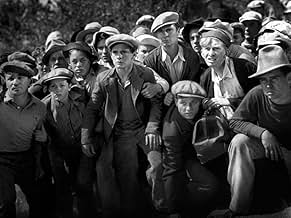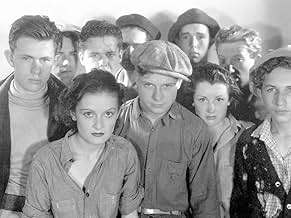In the depths of the Depression, two teenage boys strike out on their own in order to help their struggling parents and find life on the road tougher than expected.In the depths of the Depression, two teenage boys strike out on their own in order to help their struggling parents and find life on the road tougher than expected.In the depths of the Depression, two teenage boys strike out on their own in order to help their struggling parents and find life on the road tougher than expected.
- Awards
- 1 win total
- Sally
- (as Dorothy Coonan)
- Boy
- (uncredited)
- Police Sergeant
- (uncredited)
- Policeman in Court
- (uncredited)
- Brakeman Throwing Stones
- (uncredited)
- Youth in Line-up
- (uncredited)
Featured reviews
Whatever, it all plays out extremely well except for what appears to be a tacked on ending that gives a positive spin to the tale.
Grant Mitchell does fine work as Darro's depressed out-of-work father who shows his love and respect for his son when Darro sells his jalopy (for a mere $22!!) to help out the family. Interesting to note Ward Bond in an unsavory role as a railroad official who is brutally punished after taking advantage of a stowaway girl.
All of the vivid railroad scenes have been expertly photographed and the incident involving the unfortunate Phillips and his leg accident is powerfully depicted. William Wellman's direction keeps things moving swiftly and satisfactorily for a tense and gripping little social drama told in little more than an hour.
Highly recommended, especially because it's a product of its time and reveals all of the societal ills rampant in the early '30s.
The story and the situation is what puts this film over. There are no stars in Wild Boys Of The Road although some of the players eventually got reputations as competent character actors. The most well known person in this film would have to be Ward Bond playing the part of the train brakeman who sees that one of the Wild Boys is actually a girl and rapes her. Bond in his early days did play thugs like these for the most part.
The generation that proceeded me lived through the Great Depression. My uncles were in their teens at the time this film was made. In fact one of my uncles before he died told me how he left school and went to work on a farm in Brockport owned by the husband of my grandmother's cousin. He considered himself incredibly lucky to even get that kind of work even from family. Both of them could easily have been part of the gang of homeless youth.
The film centers on three of them, Frankie Darro and Edwin Phillips, a pair of kids from small town USA in the west somewhere are both up against it. Darro's father is laid off and Phillips's has died, leaving both families right on the poverty line as they would be described today. Darro and Phillips take off for the east and along the way meet up with Dorothy Coonan who is in drag for her own protection, rightly so as she finds out later. The film concerns their adventures on the road, the railroad to be precise as they catch rides aboard freight trains with an eye out for the railroad police.
Curiously enough one Hollywood star was living just this kind of life at this point. Robert Mitchum and his brother John would have been teens at this time and also left home to find any kind of work. His memories, should his widow Dorothy ever divulge them, could make the basis for another Wild Boys Of The Road.
Note in the climax scene in the courtroom where Darro, Coonan, and Phillips are before Judge Robert Barrat who usually was a bad guy in films, but is a sympathetic judge here, the Blue Eagle symbolizing the National Recovery Administration. It was one of the first initiatives of the New Deal and its presence in the film is a symbol of hope for these kids. But later on a more substantial program directly aimed at these youths was passed right around the time Wild Boys Of The Road would have been in theaters.
The Civilian Conservations Corps which took homeless kids off the streets and put them to work beautifying America's National Parks and a lot of other rural area would have been home to Darro, Phillips and the whole rest of the railroad freight hoppers. Back then liberal was not a dirty word and it was all right for government to care about the welfare of its citizens. The CCC was one of the best of the New Deal programs and it lasted all the way until World War II was declared.
And it's to the CCC which provided real salvation for so many youths of the time like Darro, Phillips and the rest that this review is respectfully dedicated to.
*** 1/2 (out of 4)
William A. Wellman directs this Depression era drama about two boys (Frankie Darro, Edwin Phillips) who run away from home and jump on the railroad route in hopes of finding a job so that they can help their families back home. Once again there must have been something inside of Wellman because there's a lot of passion in this film aimed at the poor who must do what they can to try and survive. This is a very hard hitting film that looks at this kids in a very serious light and it makes for a terrific little gem that deserves more attention than it's gotten within film history. Both Darro and Phillips are terrific in their roles and the chemistry they offer is great. Wellman's future wife, Dorothy Coonan, is also very good in her role as the boys buddy. The first twenty-minutes of the film shows the boys as normal teenagers but then we see their parents lose their jobs and thus forcing them to hit the road. This set up really sells the rest of the film and it also helps us see the suffering they're going to go through for the rest of the film. Wellman does a great job with the tender side of the story as well as a couple great fight sequences where they boys attack some railroad police as well as a rapist. Darro has a bit of Cagney in him and his performance here seems to have had a major influence on what we'd eventually see from The Dead End Kids.
Did you know
- TriviaThe movie shown in the movie theater scene (about an hour into the film) is another Warner Bros. release, Footlight Parade (1933).
- GoofsThere are no mountains in Columbus, Ohio.
- Quotes
Eddie: [to the judge] I knew all that stuff about you helping us was baloney. I'll tell you why we can't go home: because our folks are poor. They can't get jobs and there isn't enough to eat. What good will it do you to send us home to starve? You say you've got to send us to jail to keep us off the streets. Well, that's a lie. You're sending us to jail because you don't want to see us. You want to forget us. But you can't do it because I'm not the only one. There's thousands just like me, and there's more hitting the road every day.
Tommy: [also to the judge] You read in the papers about giving people help. The banks get it. The soldiers get it. The breweries get it. And they're always yelling about giving it to the farmers. What about us? We're kids!
- ConnectionsFeatured in Alibi Mark (1937)
- SoundtracksThe Gold Diggers' Song (We're in the Money)
(uncredited)
Music by Harry Warren
[Played after the kids leave the dance; also whistled by Eddie (Frankie Darro)]
- How long is Wild Boys of the Road?Powered by Alexa
Details
- Release date
- Country of origin
- Language
- Also known as
- Junaci Pavlove ulice
- Filming locations
- Southern Pacific Taylor Yard, Glendale, California, USA(train yard sequence)
- Production company
- See more company credits at IMDbPro
- Runtime1 hour 8 minutes
- Color
- Sound mix
- Aspect ratio
- 1.37 : 1
Contribute to this page



